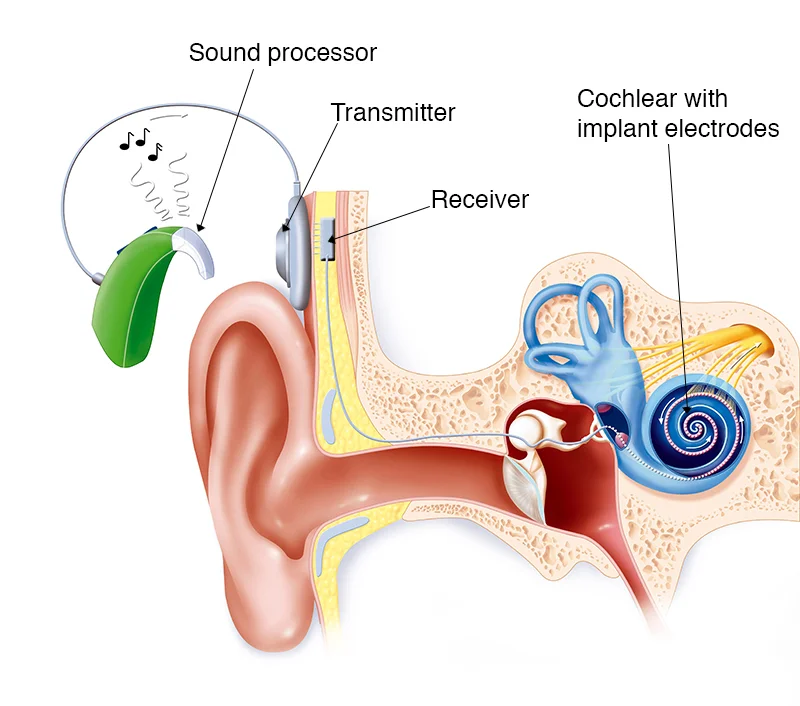
Cochlear Implant Surgery in Saharanpur/Yamunanagar: A Comprehensive Guide
What is a Cochlear Implant?
A cochlear implant is a small electronic device designed to help people with significant hearing loss regain their ability to hear. Unlike hearing aids, which amplify sounds, cochlear implants bypass damaged parts of the ear and directly stimulate the auditory nerve, enabling the brain to process sound signals.
Importance of Cochlear Implants for Hearing Loss Patients
For individuals who experience severe hearing loss, cochlear implants can be life-altering. They provide the ability to hear and understand speech, improving communication skills and enhancing the quality of life.
Who Needs Cochlear Implant Surgery?
Candidates for Cochlear Implant Surgery
Not everyone with hearing loss is a candidate for cochlear implants. Generally, this surgery is recommended for individuals with severe hearing impairment who receive little or no benefit from conventional hearing aids.
Eligibility Criteria for Surgery
Doctors assess several factors before recommending surgery, such as the extent of hearing loss, the patient’s overall health, and their commitment to post-surgery rehabilitation.

Overview of Cochlear Implant Technology
How Does a Cochlear Implant Work?
A cochlear implant system consists of external and internal components. The external part picks up sound from the environment, processes it, and sends it to the internal implant, which then stimulates the auditory nerve, allowing the person to perceive sound.
Components of a Cochlear Implant Device
The primary components include a microphone, speech processor, transmitter, receiver/stimulator, and an electrode array that interfaces with the cochlea.
Benefits of Cochlear Implants Over Hearing Aids
Differences Between Hearing Aids and Cochlear Implants
While hearing aids amplify sound, cochlear implants convert sound waves into electrical signals that the brain can interpret. This fundamental difference makes cochlear implants more effective for those with profound hearing loss.
Why Choose a Cochlear Implant?
For individuals who have struggled with hearing aids, cochlear implants can restore their ability to hear more naturally, helping them engage more fully in conversations and daily activities.
Cochlear Implant Surgery in Saharanpur and Yamunanagar
Availability of Advanced Treatment Options
Both Saharanpur and Yamunanagar offer access to top-notch medical facilities and experienced ENT specialists trained in cochlear implant surgery. The growing medical infrastructure in these cities has made advanced treatments more accessible than ever.
Leading Surgeons and Hospitals in the Region
Several reputable hospitals and clinics in Saharanpur and Yamunanagar specialize in cochlear implants. These facilities provide comprehensive care, from diagnosis to post-surgery rehabilitation, ensuring a smooth experience for patients.
Pre-Surgery Assessment and Preparations
Medical Evaluations and Tests Required
Before surgery, patients undergo a series of tests, including hearing evaluations, imaging scans, and speech-language assessments. These tests help doctors determine the best course of action.
Counseling and Expectations Before the Surgery
Patients and their families receive counseling to set realistic expectations about the outcomes of the surgery and the commitment required for post-surgery rehabilitation.
The Cochlear Implant Surgery Procedure
Step-by-Step Overview of the Surgery
Cochlear implant surgery typically takes two to three hours and is performed under general anesthesia. The surgeon makes an incision behind the ear, implants the internal device, and connects it to the auditory nerve.
What to Expect During the Operation
The surgery is relatively straightforward, with most patients experiencing minimal discomfort. After surgery, the patient will need time to heal before the external components are activated.
Post-Surgery Care and Rehabilitation
Immediate Post-Operative Care
Patients are monitored closely after surgery to ensure there are no complications. Pain and swelling are managed with medication, and the surgical site is kept clean.
Rehabilitation and Therapy for Hearing Restoration
Rehabilitation involves fine-tuning the device and regular speech therapy sessions to help the patient adjust to the new sounds they will experience. This process is crucial for optimal results.
Challenges and Risks Associated with Cochlear Implant Surgery
Possible Complications and Side Effects
As with any surgery, cochlear implant procedures carry risks like infections, device malfunction, and dizziness. However, these risks are relatively rare and can be managed effectively.
How to Overcome Common Challenges
Support from medical professionals and family plays a significant role in overcoming challenges during recovery. Patience and persistence are key to adapting to the new hearing experience.
Success Rates and Outcomes of Cochlear Implant Surgery
Real-Life Success Stories
Many patients have successfully regained their ability to hear after receiving cochlear implants. These success stories highlight how the surgery can dramatically improve communication and social interactions.
Long-Term Results and Patient Experiences
Over time, patients usually experience better sound clarity and speech understanding, significantly enhancing their overall quality of life.
Cost of Cochlear Implant Surgery in Saharanpur/Yamunanagar
Factors Affecting the Cost
The cost of cochlear implant surgery can vary depending on factors like the hospital, surgeon’s expertise, and the specific device used.
Insurance Coverage and Financial Assistance Options
Some insurance policies may cover part of the surgery cost. Additionally, there are financial assistance programs available for those who qualify.
FAQs on Cochlear Implant Surgery
What is the recovery time for cochlear implant surgery?
Recovery usually takes a few weeks, with full hearing capability restored after device activation and rehabilitation.Are cochlear implants permanent?
Yes, cochlear implants are designed to be a lifelong solution, with routine maintenance required.Will I be able to hear immediately after surgery?
No, the external components are activated a few weeks after surgery, followed by gradual hearing improvement through rehabilitation.Is cochlear implant surgery painful?
Most patients report minimal pain, which can be managed with prescribed medications.Can both children and adults receive cochlear implants?
Yes, cochlear implants are suitable for all age groups, from infants to the elderly.
